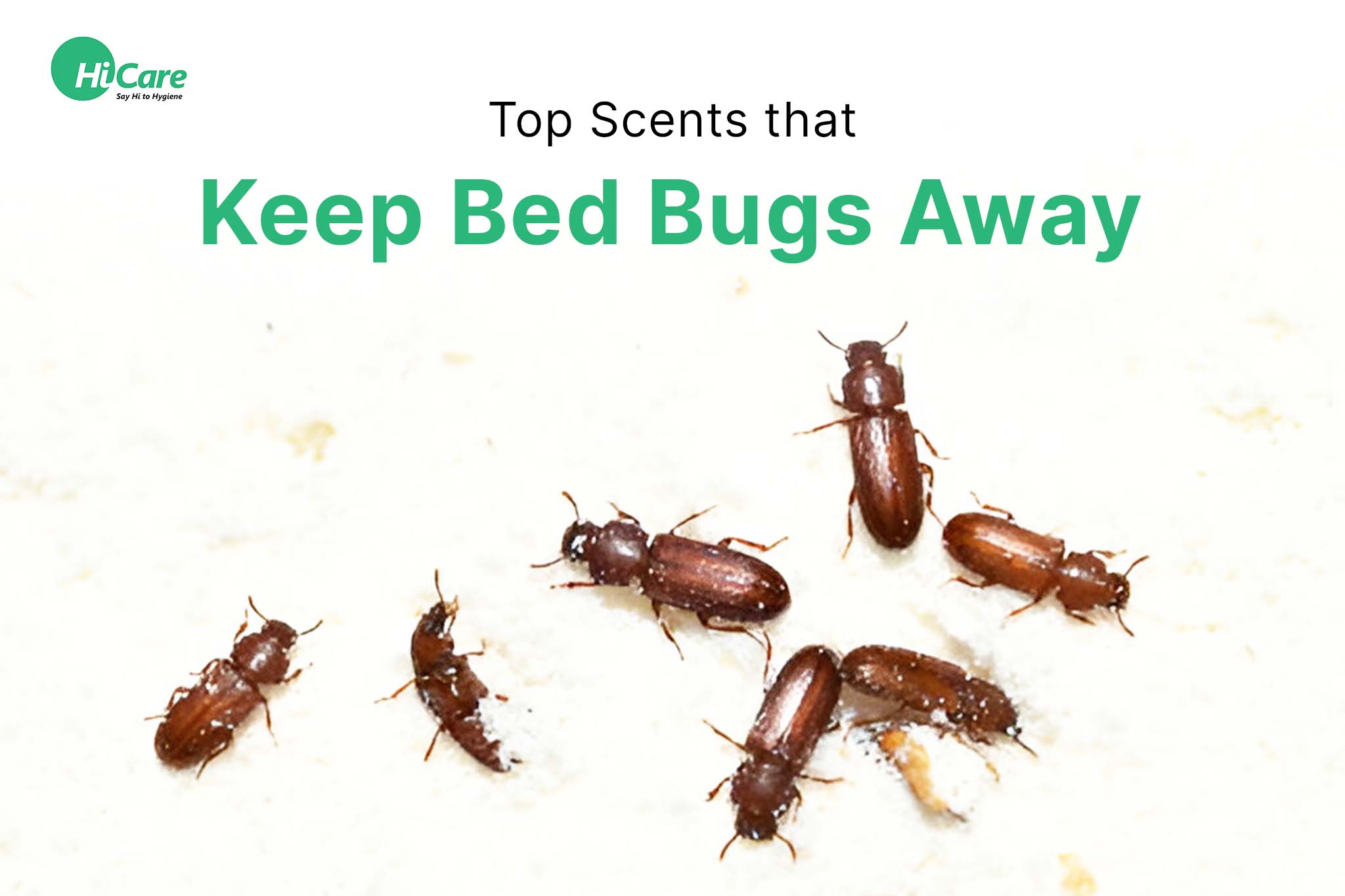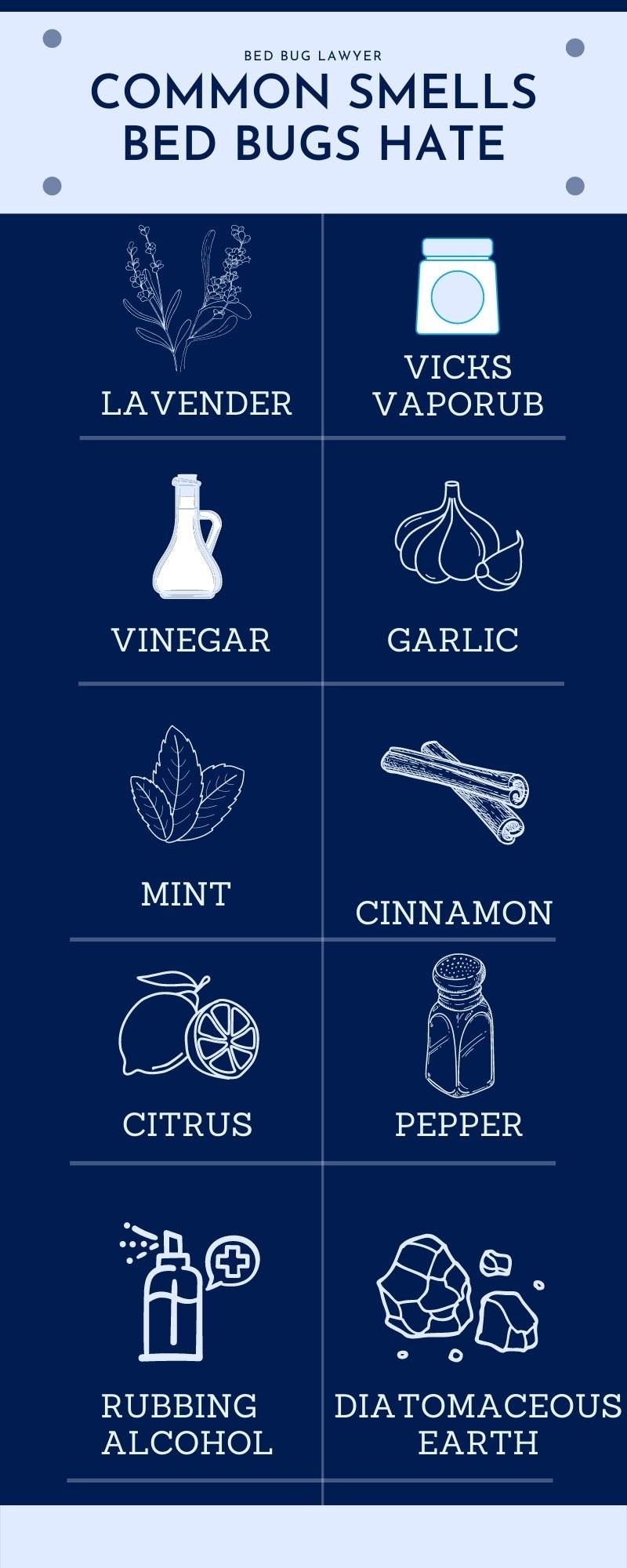Bed bugs dislike the smells of essential oils like lavender, tea tree, and peppermint. Strong scents from alcohol and vinegar also repel these pests.
Bed bugs are notorious for invading homes and causing sleepless nights. Understanding what smells repel these pests can help in prevention and control. Many homeowners seek natural solutions to combat bed bugs without harsh chemicals. Essential oils have gained popularity for their effectiveness and pleasant fragrances.
Using scents that bed bugs hate can create an unfriendly environment for these unwelcome guests. This approach not only helps in repelling bed bugs but also adds a refreshing aroma to your living space. Explore the various smells that can help keep these pests at bay while maintaining a comfortable home.
Introduction To Bed Bug Deterrents
Bed bugs are a growing problem in many homes. These tiny pests can disrupt sleep and cause stress. Finding ways to deter them is crucial. One effective method involves using scents that bed bugs dislike. Understanding these scents can help in creating a pest-free environment.
The Significance Of Scent In Pest Control
Scent plays a vital role in pest control strategies. Many pests, including bed bugs, rely on their sense of smell. Certain odors can repel these unwanted guests. Using these scents can reduce their presence in homes.
- Natural Repellents: Essential oils can deter bed bugs.
- Chemical Scents: Some chemicals are effective against pests.
- Odor Elimination: Regular cleaning removes scents that attract bed bugs.
Bed Bugs: An Evolving Challenge
Bed bugs are adapting to various environments. They can develop resistance to some treatments. This makes pest control more difficult. Understanding their behavior helps in choosing the right deterrents.
| Scent | Effectiveness | Application Method |
|---|---|---|
| Lavender | High | Spray or diffuser |
| Peppermint | Medium | Essential oil mix |
| Eucalyptus | High | Spray or oil |
| Cinnamon | Medium | Powder or oil |
Using these scents can create a protective barrier. They help keep bed bugs at bay, ensuring a peaceful sleep. Regularly apply these scents for the best results.

Credit: hicare.in
The Bed Bug Menace
Bed bugs are tiny creatures that can cause big problems. They live in beds and bite people at night. Their bites can be itchy and uncomfortable. Bed bugs are hard to see and even harder to get rid of. Understanding these pests is the first step to keeping them away.
Identifying The Enemy
Bed bugs are small, brownish insects. They are about the size of an apple seed. They hide in cracks and crevices during the day. At night, they come out to feed on blood.
Here are some signs of bed bugs:
- Small, red bites on your skin.
- Dark spots on your mattress or sheets.
- A musty odor in your room.
If you see these signs, you might have bed bugs. Early detection is key to controlling them.
Impact On Human Habitats
Bed bugs can invade many places in your home. They love to hide in beds, sofas, and even clothes. They can also spread to other rooms and apartments.
The impact of bed bugs includes:
- Discomfort from bites.
- Stress and lack of sleep.
- Costs for pest control services.
Bed bugs can make life very difficult. Keeping them away is important for your health and comfort.
| Common Hiding Places | Signs of Infestation |
|---|---|
| Beds | Dark spots, musty smell |
| Sofas | Red bites, tiny eggs |
| Clothes | Itchy skin, shed skins |
Knowing where bed bugs hide can help you find them. Use this information to protect your home.
Nature’s Repellents
Bed bugs are pesky insects. They invade homes and cause discomfort. Luckily, certain scents repel them. Using natural aromas can help keep these pests away. Let’s explore what smells bed bugs hate.
Essential Oils That Disgust Bed Bugs
Essential oils are powerful against bed bugs. They contain natural compounds that irritate these pests. Here are some effective essential oils:
| Essential Oil | Repellent Properties |
|---|---|
| Lavender Oil | Calming scent for humans, repulsive for bed bugs. |
| Peppermint Oil | Strong minty aroma disrupts bed bug senses. |
| Eucalyptus Oil | Intense smell deters bed bugs effectively. |
| Tea Tree Oil | Known for its antibacterial properties and pest-repelling effects. |
| Lemon Oil | Citrus scent irritates bed bugs and keeps them away. |
Mix these oils with water in a spray bottle. Spray around the bed and furniture. This creates a protective barrier against bed bugs.
Herbal Aromas Bed Bugs Despise
Herbs can also repel bed bugs. Their scents are unappealing to these pests. Consider these herbs:
- Rosemary – Strong aroma that annoys bed bugs.
- Basil – Fresh scent keeps pests at bay.
- Thyme – Powerful smell disrupts bed bug behavior.
- Mint – Refreshing scent that bed bugs dislike.
Plant these herbs around your home. Dried versions can also be effective. Keep sachets of dried herbs near sleeping areas. This enhances protection against bed bugs.

Credit: bedbuglawyer.org
Chemical Repellents And Their Efficacy
Bed bugs can be a nuisance. Many people seek ways to repel them. Chemical repellents offer a solution. They contain substances that bed bugs dislike. Knowing their effectiveness is essential.
Synthetic Options On The Market
Many synthetic options exist for bed bug control. Here are some common chemical repellents:
| Repellent | Main Ingredient | Efficacy |
|---|---|---|
| Pyrethroids | Permethrin | Effective, but resistance is growing |
| Insect Growth Regulators | Hydroprene | Disrupts development, not an instant kill |
| Essential Oils | Clove, Lavender | Natural, but may require frequent application |
Synthetic repellents can be effective. They may kill bed bugs on contact. Some prevent their growth. Effectiveness varies based on the product and the strain of bed bugs.
Safety Concerns With Chemical Repellents
Using chemical repellents raises safety issues. Here are some concerns:
- Human Health: Some chemicals may cause skin irritation.
- Pets: Many repellents can harm pets if ingested.
- Environmental Impact: Chemicals can affect local wildlife.
Always read product labels. Ensure safety instructions are followed. Some people prefer natural alternatives due to these concerns.
Diy Odor Repellent Solutions
Bed bugs can be a nightmare. DIY odor repellent solutions offer a natural way to keep them at bay. Many common household items create effective sprays and mixtures. These solutions are safe, easy to make, and cost-effective.
Homemade Sprays And Mixtures
Try these simple recipes to create your own bed bug repellent:
- Essential Oil Spray
- 10 drops of peppermint oil
- 10 drops of tea tree oil
- Water (to fill a spray bottle)
Mix oils and water in a spray bottle. Shake well before use. Spray areas where bed bugs hide.
- Vinegar Solution
- 1 cup of white vinegar
- 1 cup of water
Combine vinegar and water in a spray bottle. Spray on infested areas.
- Alcohol Spray
- 1 cup of rubbing alcohol
- 1 cup of water
Mix alcohol and water in a spray bottle. Apply directly to bed bugs.
Precautions When Using Diy Methods
Safety is important with DIY solutions. Keep these precautions in mind:
- Always test a small area first. Check for discoloration.
- Store sprays out of reach of children and pets.
- Avoid mixing different essential oils. This can create harmful reactions.
- Use sprays in well-ventilated areas. Prevent strong odors from lingering.
Stay vigilant. Regularly apply these DIY solutions. Keep bed bugs away and enjoy a peaceful sleep.
Professional Pest Control
Dealing with bed bugs can be challenging. DIY methods often fall short. Professional pest control offers effective solutions. Experts use specialized techniques to eliminate bed bugs. They know the best methods and products for the job.
When To Call The Experts
Recognize the signs of a bed bug infestation. Look for bites on your skin. Check for small blood stains on sheets. Find tiny dark spots, which are bed bug droppings. If you notice these signs, it’s time to seek help.
Consider calling professionals in these situations:
- Your infestation is widespread.
- DIY methods fail to work.
- You are unsure about the extent of the problem.
- You want a long-term solution.
Pros And Cons Of Professional Interventions
| Pros | Cons |
|---|---|
| Effective elimination of bed bugs | Can be costly |
| Expert knowledge and experience | May require multiple visits |
| Access to advanced treatments | Some treatments may be harmful to pets |
| Long-lasting results | Time-consuming process |
Weigh the pros and cons before deciding. Professional pest control can be a strong ally. Make sure to choose a reputable service. They will tailor their methods to your needs.
Preventive Strategies
Keeping bed bugs away requires effective preventive strategies. Certain smells repel these pests. Implementing cultural practices and maintaining a regular cleaning regimen helps ensure your home remains bed bug-free.
Cultural Practices To Keep Bed Bugs At Bay
Adopting certain cultural practices can significantly reduce the risk of bed bug infestations. Here are some useful tips:
- Inspect Second-Hand Items: Check for bed bugs before bringing items home.
- Use Protective Covers: Encase mattresses and pillows with bed bug-proof covers.
- Seal Cracks and Crevices: Fill gaps in walls and furniture to prevent entry.
- Maintain Low Clutter: Keep spaces tidy to eliminate hiding spots.
Regular Cleaning Regimens
A consistent cleaning routine plays a vital role in bed bug prevention. Follow these steps to keep your home clean:
- Vacuum Frequently: Vacuum floors, carpets, and furniture at least once a week.
- Wash Bedding Weekly: Use hot water to wash sheets and pillowcases.
- Dry at High Temperatures: Dry bedding and clothes on high heat to kill bugs.
- Check Luggage After Travel: Inspect and clean luggage before storing it.
By following these practices, you can create an environment that bed bugs dislike. Regular cleaning and cultural practices help maintain a pest-free home.
The Science Behind Smell And Repellency
Understanding what smells repel bed bugs can help in prevention. Bed bugs rely heavily on their sense of smell. They use it to find food and mates. Certain scents can deter them effectively.
Understanding Bed Bug Sensory Mechanisms
Bed bugs have specialized sensory organs. These organs detect various odors in their environment. They can sense carbon dioxide, body heat, and specific chemical signals.
- Sensory Organs: Bed bugs have antennae that detect smells.
- Carbon Dioxide: They are attracted to carbon dioxide from humans.
- Pheromones: Chemical signals help them communicate.
These mechanisms help bed bugs locate hosts and reproduce. Disrupting their sense of smell can prevent infestations.
Research On Olfactory-based Repellents
Studies explore various scents that repel bed bugs. Essential oils show promising results. Common oils include:
- Lavender Oil
- Peppermint Oil
- Tea Tree Oil
- Eucalyptus Oil
Researchers tested these oils in controlled environments. Results indicated a significant decrease in bed bug activity. The table below summarizes the effectiveness:
| Essential Oil | Repellency Rate (%) |
|---|---|
| Lavender Oil | 85 |
| Peppermint Oil | 78 |
| Tea Tree Oil | 82 |
| Eucalyptus Oil | 76 |
These findings suggest using essential oils in pest control. Homeowners can create a mixture to spray in infested areas. This method is safe and effective.
Future Of Odor Repellents In Bed Bug Control
As bed bugs become more resistant to traditional pesticides, the need for effective odor repellents grows. These products can deter bed bugs using scents they dislike. The future holds exciting possibilities for innovation in this field.
Innovations On The Horizon
Research is underway to develop new and effective odor repellents. Scientists focus on both chemical and natural compounds. Here are some potential innovations:
- Smart sprays: These target specific odors that bed bugs hate.
- Diffusers: Continuous release of repellent scents in infested areas.
- Bed bug traps: Incorporating unpleasant smells to lure and capture bugs.
- Wearable devices: Personal repellents that release scents to deter bed bugs.
Potential For Natural Repellent Development
Natural repellents offer a safe alternative to harsh chemicals. Many plants produce scents that repel bed bugs. Research into these natural options is promising.
Some effective natural repellents include:
| Plant | Repellent Compound | Effectiveness |
|---|---|---|
| Lavender | Lavandula oil | Strong repellent |
| Peppermint | Menthol | Moderate repellent |
| Eucalyptus | Eucalyptol | Moderate repellent |
The future of bed bug control looks bright. With ongoing research, effective and safe repellents will emerge. This will help reduce infestations and improve quality of life.

Credit: ecoearthbedbugdogs.com
Frequently Asked Questions
What Scents Repel Bed Bugs Effectively?
Bed bugs are known to dislike certain scents. Essential oils like lavender, peppermint, and tea tree oil can deter them. Spraying these oils around your home may help keep them at bay. However, it’s essential to note that these scents are not a permanent solution for infestations.
Do Bed Bugs Hate Lavender Smell?
Yes, bed bugs generally dislike the smell of lavender. This pleasant aroma can act as a natural repellent. Spraying lavender essential oil in your bedroom can create an unfavorable environment for these pests. However, it should be combined with other pest control methods for effectiveness.
Can Peppermint Oil Eliminate Bed Bugs?
Peppermint oil can repel bed bugs but not eliminate them. Its strong scent is offensive to these pests, making it a useful deterrent. Mixing peppermint oil with water and spraying it around your home may help. However, for severe infestations, professional pest control is recommended.
What Other Odors Do Bed Bugs Dislike?
Bed bugs are also repelled by odors like cinnamon, clove, and vinegar. These scents disrupt their environment and can deter them from infesting. While they may not eliminate bed bugs, using these odors can reduce their presence. Combining them with thorough cleaning can enhance effectiveness.
Conclusion
Understanding what smells repel bed bugs can be a game changer in pest control. Utilizing scents like lavender, peppermint, and tea tree oil can help keep these pests at bay. Combining these natural repellents with good hygiene practices creates a formidable defense against infestations.
Stay proactive to protect your space effectively.

